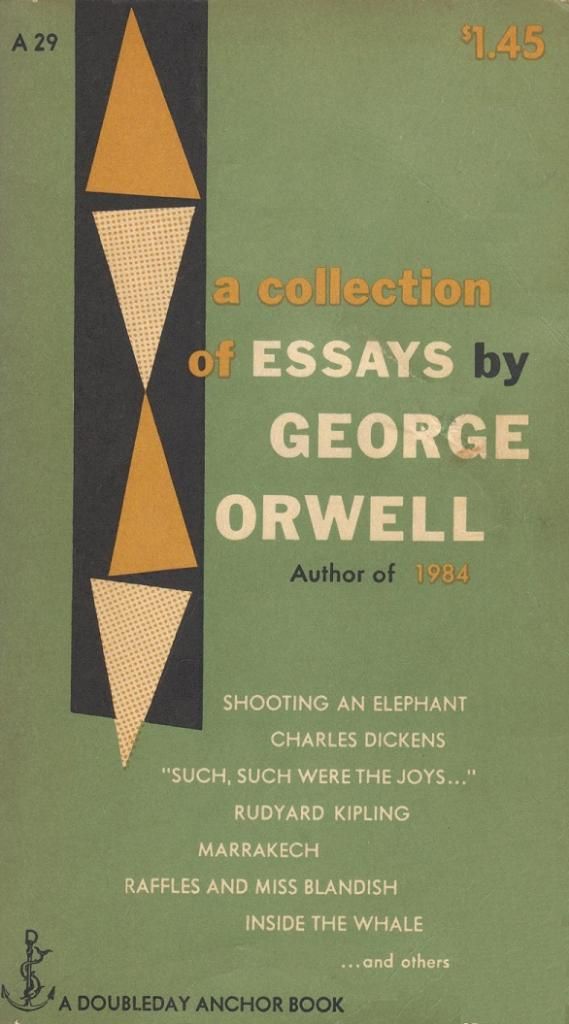 It's too bad that George Orwell is known by many just as the author of Nineteen Eighty-Four and Animal Farm. The first is, of course, an almost supernatural preview (published in 1949) of how totalitarian states would come to control the thoughts of their subjects while convincing them that they never had it so good, among other ways by corrupting the language so that there is no way to think straight. I've never read Animal Farm, partly because I suspect that its much-quoted aphorism sums it up perfectly: "All animals are equal, but some are more equal than others."
It's too bad that George Orwell is known by many just as the author of Nineteen Eighty-Four and Animal Farm. The first is, of course, an almost supernatural preview (published in 1949) of how totalitarian states would come to control the thoughts of their subjects while convincing them that they never had it so good, among other ways by corrupting the language so that there is no way to think straight. I've never read Animal Farm, partly because I suspect that its much-quoted aphorism sums it up perfectly: "All animals are equal, but some are more equal than others."
I too have delved only sporadically in Orwell's other writings, and not at all into his fiction besides Nineteen Eighty-Four, until lately. I bought a paperback collection of some of his essays -- the anthology published in 1954 and whose cover art reflects that era -- at a library book sale for two bits, maybe the best 25 cents I ever spent. And in reading it, I was gobsmacked by its brilliance on many subjects.

It would be a mistake to take Orwell only as a perceptive observer of the many books, people, and places he experienced ... although he was that. But anyone sensitive to writing style is bound to be equally amazed at that side of him as shown in these pieces from the 1930s and 1940s.
The language can be colorful, even poetic at times. But you don't get the feeling he is straining to be "literary." He sees, he thinks, he conveys what he sees and thinks. Every word is the right word for the idea, every sentence fits into the paragraph like a piece of a jigsaw puzzle, every paragraph flows from the previous one and lures you into the next.
When Orwell was a British colonial official in Burma, an elephant broke its chain under the influence of must ("a state of frenzied sexual excitement in the males of certain large mammals, esp elephants, associated with discharge from a gland between the ear and eye" -- World English Dictionary). The animal threatened to go on a rampage.
The villagers expected Orwell, as the senior colonial officer, to shoot the creature. Orwell was anti-colonialist, but understood his job as a representative of the Crown -- he could not be seen as unequal to the situation.
A sahib has got to act like a sahib; he has got to appear resolute, to know his own mind and do definite things. To come all that way, rifle in hand, with two thousand people marching a my heels, and then to trail freely away, having done nothing -- no, that was impossible. The crowd would laugh at me. And my whole life, every white man's life in the East, was one long struggle not to be laughed at.
But I did not want to shoot the elephant. I watched him beating his bunch of grass against his knees, with that preoccupied grandmotherly air that elephants have. It seemed to me that it would be murder to shoot him.
Nevertheless, Orwell braced himself and fired the rifle. His description of what happened next is factual and descriptive, but the tone is compassionate in a way that doesn't sound self-righteous.
[The elephant] neither stirred nor fell, but every line of his body had altered. He looked suddenly stricken, shrunken, immensely old, as though the frightful impact of the bullet had paralysed him without knocking him down. At last, after what seemed a long time -- it might have been five seconds, I dare say -- he sagged flabbily to his knees. His mouth slobbered. An enormous senility seemed to have settled upon him. ...
I fired a third time. That was the shot that did for him. You could see the agony of it jolt his whole body and knock the last remnant of strength from his legs. But in falling he seemed for a moment to rise, for as his hind legs collapsed beneath him he seemed to tower upward like a huge rock toppling, his trunk reaching skywards like a tree. He trumpeted, for the first and only time.
In 1946, as a sort of forerunner to Nineteen Eighty-Four, Orwell wrote a piece called "Politics and the English Language." He said, "When the general atmosphere is bad, language must suffer." He was particularly hard on the kind of wordy, opaque phrasing that had already become common at the time, probably because the huge growth of government bureaucracies in a world fighting a war.
... If thought corrupts language, language can also corrupt thought. A bad usage can spread by tradition and imitation, even among people who should and do know better. The debased language that I have been discussing is in some ways very convenient. Phrases like a not unjustifiable assumption, leaves much to be desired, would serve no good purpose, a consideration which we should do well to bear in mind, are a continuous temptation, a packet of aspirins always at one's elbow. ... This invasion of one's mind by ready-made phrases can only be prevented if one is constantly on guard against them, and every such phrase anaesthetizes a portion of one's brain.
He offers several rules for avoiding common usages that deaden writing:
(i) Never use a metaphor, simile or other figure of speech which you are used to seeing in print.
(ii) Never use a long word where a short one will do.
(iii) If it is possible to cut a word out, always cut it out. [RD note: I would delete "always."]
(iv) Never use the passive where you can use the active.
(v) Never use a foreign phrase, a scientific word or a jargon word if you can think of an everyday English equivalent.
(vi) Break any of these rules sooner than say anything outright barbarous.
I don't believe anyone can observe all these without slipping from time to time, but Orwell is a remarkable guide to one way of written excellence.
















